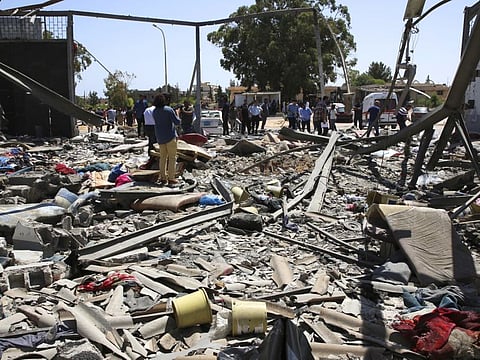US blocks UN resolution condemning Libya strike
Libyan general Khalifa Haftar has succeeded in garnering international backing

Dubai: Washington on Thursday refused to condemn an air strike on a detention centre that killed dozens of migrants blamed on Libyan general Khalifa Haftar who heads the Libyan National Army. The LNA deny involvement in the air strike and have blamed militias allied to Al Sarraj’s government.
The decision could prove damaging for the internationally-recognised Government of National Accord (GNA) led by Fayez al-Sarraj - as well as for the UN’s influence and human rights in war-torn Libya.
Washington’s move “should not come as a surprise”, said James Dorsey, a researcher at Singapore’s S. Rajaratnam School of International Studies.
“It is a sign of US policy changing towards Libya.”
Following more than two hours of deliberations on Wednesday, the United States blocked the UN Security Council from adopting a unanimous statement condemning the incident.
The US representatives at the UN gave no explanation for the Trump administration’s decision not to condemn the outrage.
The British-drafted text did not lay the blame with either side of the bitter conflict that has pitted Haftar’s eastern power-base against forces aligned with the UN-recognised government in Tripoli.
Instead it called for a ceasefire and a resumption of talks.
But Washington refused to give the final go-ahead for the text to be adopted, according to a European diplomatic source.
Mired in chaos since the 2011 toppling of Muammar Gaddafi, Libya is ruled by two rival factions - Al Sarraj’s GNA in the west, and Haftar’s LNA in the east.
The UN has previously failed to agree a unified position after the Libyan National Army (LNA) launched an assault on GNA-held Tripoli in April.
“The US have not withdrawn in any form or sense their recognition of - nor revoked their support to - the GNA, but de facto there has been contacts with Haftar at the highest level,” added Dorsey.
After Haftar began to wage war on the country’s west, US President Donald Trump called him to praise his “significant role in fighting terrorism and securing Libya’s oil resources” and “shared vision”.
“Haftar fulfils an important criteria in the eyes of Washington: He is projecting himself against the Islamists,” said Dorsey.
Haftar receives support from Egypt, France, the UAE and Saudi Arabia - while even Russia has unusually sided with Washington and tilted towards him even as the GNA won backing from Turkey and Qatar.
Haftar ‘not after the oil’
Meanwhile, in comments to Bloomberg, Haftar said he is focused on taking control of the capital Tripoli and isn’t interested in exporting oil on his own.
He said the Tripoli-based National Oil Corp. - or NOC, as the company that sells the nation’s crude for the UN-backed government in the capital is known - has the “exclusive” right to export Libya’s crude.
Haftar denied accusations that his forces seized NOC airports, while retaining the right to use them if needed. He pledged to continue to protect oil facilities. The commander urged the oil producer not to use its resources to “support terrorists and armed militias, and to avoid interfering” with his army or working against it.
“The army isn’t a trader,” Haftar said in a written response to Bloomberg News questions, referring to his self-styled Libyan National Army. “It doesn’t sell oil, legally or illegally.”
Sign up for the Daily Briefing
Get the latest news and updates straight to your inbox


